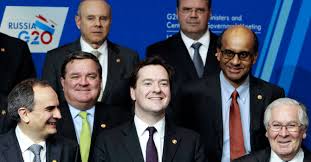The Finance Ministers and Central Bankers of the G20 met as scheduled in Moscow at the end of the week. This periodic meeting is just a part, though a key part, of the “iceberg” that is global summitry today. A fascinating factoid – this meeting of “finance” officials does not generally include the central bank officials when it gathers at the actual G20 Leaders Summit. Given the key role that central bankers have been playing in trying to “right” the global economy, that probably should come to an end. But in any case their communiqué underlined the Iceberg Theory that I and others have identified for some time.
Many experts including many in the media focus their attention on the Leaders Summits themselves and seldom venture further down the iceberg. But taking the plunge enables one to see the global governance process working away. It certainly isn’t very “sexy” and dwells often in a bureaucratic and transgovernmental regulatory world. But it is where often the hard work is being done. And in this meeting a number of important reports were identified that are making their way to to the Leaders scheduled to meet in St. Petersburg on September 5th and 6th.
But just before I go there, the tenor of the communiqué is clear – the global economic policy is about growth and jobs – austerity has been downgraded. We have come a long way from the Toronto Summit where President Obama urged continuing stimulus. He was all but ignored by leaders from Germany, Canada and the UK urging fiscal consolidation. That no longer appears to be the case. As Ministers urged in this communiqué:
4. To place the global economy on a stronger, more sustainable and more balanced path, we will intensify our policy actions and develop a comprehensive St. Petersburg Action Plan. We agreed that our near term priority is to boost jobs and growth.
So there will be an Action Plan in St. Petersburg that will likely make recommendations on medium-term fiscal and economic policy and will likely examine needed structural economic reform to improve productivity, labor force participation and employment. But meanwhile the immediate path is jobs and growth.
Also front and center was a report from the OECD, endorsed by the ministers in Moscow. This Report (Base Erosion and Profit Shifting) examines multinational tax-minimization strategies. The plan to presented apparently at St. Petersburg will recommend 15 new principles for nations to adopt. Among the principles apparently will be rules that would stop companies from deducting debt in high-taxing states where the interest receipts are not taxed elsewhere using special company vehicles that funnel money to tax havens.
What else did the communiqué identify including tasks and reports by various organizations that could find its way to a later Minister’s gathering and possibly to a Leaders Summit? Some include:
- The IMF and the World Bank are reviewing and updating the “Guidelines for Public Debt Management”;
- An OECD interim report on leading practices for raising, managing and retiring public debt, including on state guarantees, by the next minister’s meeting;
- OECD proposals for tax transparency with the object of providing a new single global standard for automatic exchange of information. Work is to be completed by 2014;
- The completion of a Report by the Basel Committee on Banking Supervision (BCBS) to assess the consistency of jurisdictions’ rules with respect to Basel III;
- The Financial Stability Board (FSB) will report at St. Petersburg Summit on the progress and next steps towards addressing the “too big to fail” issue.
- For the Australia Summit (November 2014) the International Association of Insurance Supervisors (IAIS) and the FSB are tasked to complete their work on capital requirements for the sector. The FSB has just recently produced the initial list of Global Systemically Important Insurers (G-SII);
- A report by September from key regulators on implementing OTC derivatives reforms especially concerning cross-border issues;
- Further FSB recommendations for the Leaders’ Summit for the oversight and regulation of the shadow banking system;
- Outcomes from a G20 high-level seminar on benchmarks and credit rating agencies (CRAs). A progress report for St. Petersburg is expected from the FSB designed to reduce reliance on CRA ratings;
- A Report to Leaders on possible improvements to transparency and functioning of commodity markets to prevent excessive price volatility; and
- Reporting to leaders on discussions for climate financing and ways to mobilize resources and to propose ways forward.
So much work is being done down in the iceberg to resolve the many issues that were identified at the time of the global financial crisis. Some clearly will be implemented; some may not. What is critical is to follow the path to determine how much coordination nationally is achieved by these efforts. Effectiveness at the global governance level is dependent on the national level. That is global summitry today.


